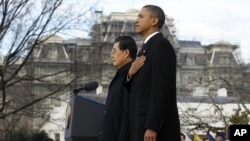China has agreed to $45 billion in export deals with U.S. companies, with nearly half of the contracts a commitment to buy 200 Boeing aircraft costing $19 billion.
In advance of an official announcement, a senior White House official said on Wednesday the trade agreements would cover a broad range of manufacturing, chemical, agriculture and technology investments. The official said the deals would benefit 70 companies in 12 U.S. states and support 235,000 jobs.
As part of the agreement, China also said it would add another $3 billion in investments to Chinese firms in the U.S.
News of the trade deals came as U.S. President Barack Obama and Chinese President Hu Jintao opened a summit at the White House. While the two leaders face disagreements on human rights and currency valuation issues, the U.S. has also pushed to sharply narrow its significant trade gap with the world's most populous nation. China-U.S. trade totals more than $400 billion annually, but China's trading surplus might have reached $270 billion last year.
Mr. Obama has invited some of the top U.S. business leaders to meet with him and Mr. Hu in an effort to help promote American exports to China.
Chief executives from such well-known U.S. companies as Microsoft, the Goldman Sachs Group, General Electric, Boeing and Coca-Cola are among 14 that Mr. Obama invited. Mr. Hu brought along four key business executives representing Chinese computer technology, home appliance, automotive parts and investment companies.
While the leaders mentioned ongoing policy differences between them during the official opening ceremony on the White House lawn, the U.S. has also cited the "important economic relationship" between the countries.
Creation of more U.S. jobs is particularly important to Mr. Obama, as the U.S. has struggled to reduce unemployment. Nine percent or more of the American workforce has been jobless for 20 straight months.
Numerous U.S. companies are seeking to increase their foothold in China, one of the key ones being General Electric. The international conglomerate is signing a number of deals with China this week involving energy, rail and aviation manufacturing, deals that GE thinks will boost its profits and save U.S. jobs.
Some U.S. firms say that their initial investments in China have proved difficult, complaining that Chinese government regulations favor China's firms and that protection of intellectual property laws is weak. As part of the new trade agreements, China says it will deal with foreign companies in a more even-handed manner and allow use of more imported technology.
Some information for this report was provided by AP, AFP and Reuters.




